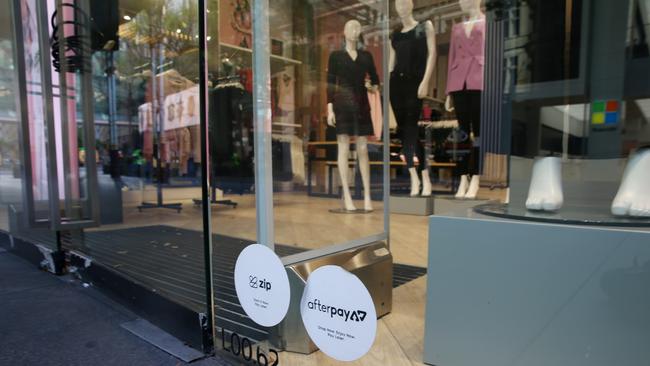RBA wants retailers to be able to pass on BNPL costs
The central bank may compel buy now, pay later operators such as Afterpay to ditch the no-surcharge rules currently forced on retailers.

Consumers could soon be paying more to use buy now, pay later services, with the Reserve Bank indicating it may compel operators such as Afterpay to ditch the no-surcharge rules currently forced on retailers.
Speaking at a payments event on Tuesday, RBA’s head of payments policy Ellis Connolly said the central bank would kick off a review of payments regulation, including on the no-surcharge rules, as soon as federal parliament passes the bill that hands it greater powers over digital wallet providers and buy now, pay later services.
The planned review will see the central bank probe whether current surcharging rules are fit for purpose, Mr Connolly said.
“In 2021, the RBA concluded that merchants should be allowed to surcharge BNPL services. The RBA’s view at the time was that any benefits of no-surcharge rules in terms of supporting new entry into the payments market was outweighed by the costs in terms of efficiency and competition in the payments system. However, it was not clear that the RBA had the power to require the removal of these no-surcharge rules,” Mr Connolly said.
“After the reforms to the Payment Systems Regulation Act, the RBA plans to revisit this issue as part of a broader review of whether the RBA’s surcharging framework remains fit for purpose.”
The central bank’s surcharging regulations “aim to encourage consumers to use lower-cost payment methods and strengthen the bargaining position of merchants relative to payment system operators”, he added.
“It is time to ask whether the surcharging framework is still fit for purpose and whether any changes need to be made.”
Responding to the RBA comments, BNPL operator Afterpay said it had been working with the federal government on the development of a balanced regulatory framework for the sector.
“We welcome the RBA’s recognition that new developments must be considered in future policy decisions that affect the payments ecosystem. In particular, the impact of BNPL credit regulation, the cost of living, as well as the importance of choice and competition in the payments sector, for both merchants and consumers,” an Afterpay spokeswoman told The Australian.
“Afterpay and the BNPL sector has been working with the Albanese government to support the development of a balanced, fit-for-purpose BNPL regulatory framework that puts Australian consumers first while enabling the payments sector to continue to grow and adapt to future innovations.”
While shoppers have embraced these services in recent years – the value of BNPL transactions was around $20bn in 2023 – the costs to merchants are much higher than card fees.
The average BNPL transaction costs a merchant around 3.5 per cent of the value of the sale, compared with 0.8 per cent when a credit card is used and 0.4 per cent for a debit card. But BNPL services do not allow merchants to pass on the cost to consumers through surcharging.
As part of the planned review, the RBA will also examine fee transparency in mobile wallet use, merchant payment costs, including for Visa and MasterCard, and the high cost of cross-border payments.
The credit card giants, in particular, appear in the RBA’s sights following a 43 per cent lift in fees paid to these operators by the banks between 2021 and 2022. This compares to a 16 per cent lift in card transactions over the same period.
“Scheme fees have been rising, increasing costs for merchants. These fees can be very complex and opaque, and unlike interchange fees, there are no regulations restricting their growth,” Mr Connolly said.
“Greater transparency of the scheme fees being charged by each card network could help merchants better understand these fees and make better informed decisions, such as to which network they route debit transactions.”
Most of the very strong growth in scheme fees was for international card transactions, he said.
Mr Connolly’s comments came as Apple announced it would axe its buy now, pay later service just months after its launch in favour of a new loan offering to be rolled out globally – including in Australia – via credit, debit cards and lenders.
“This solution will enable us to bring flexible payments to more users, in more places across the globe, in collaboration with Apple Pay enabled banks and lenders,” an Apple spokeswoman said on Tuesday.






To join the conversation, please log in. Don't have an account? Register
Join the conversation, you are commenting as Logout